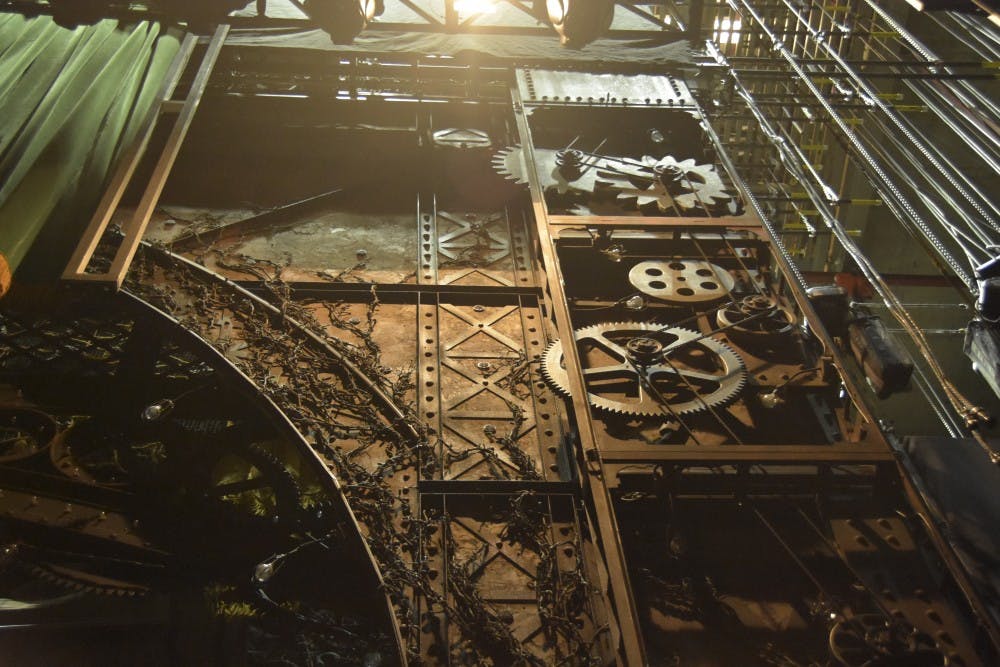Popejoy Hall, known for attracting high profile performances to New Mexico, saw the return of the national touring production of the Broadway phenomenon “Wicked” on Oct. 17.
The show tells the story behind the two iconic witches of “The Wizard of Oz.” Its powerful narrative of female friendship and the far-reaching effects of oppression told through a clever script and beautiful songs has made it an international success, and Albuquerque audiences share in the enthusiasm.
“Albuquerque seems to be incredibly receptive to Broadway,” said Jan Turri, the local publicist for the Broadway in New Mexico series at Popejoy. “Popejoy is one of the best houses, and it’s the perfect place for Broadway.”
The musical centers around Elphaba, the girl who would become known as the Wicked Witch of the West. From the beginning of her life, her green skin has set her apart and made her an object of revulsion in the eyes of others.
Elphaba is determined not to let people’s ignorance stand in the way of her ambitions and gets an opportunity to prove herself when she is sent to university to take care of her wheelchair bound sister, Nessarose. There, she meets the beautiful and bubbly Glinda, who seems to be her opposite in every way. Soon, however, the two girls begin to bond with each other and they must decide whether they will remain loyal to each other or let the pressures of their society tear them apart.
Seeing “Wicked” feels particularly relevant to today’s political climate. Its focus on those who are seen as the “others” of society and how they are often blamed for its problems, intertwined with theme of truth as something subjective. The lies told by the powerful characters shape the conflict of the show and cause those that they oppress to turn against each other in a different form of violence.
Another theme of the show that relates to current issues is the power of the feminine and women making their voices heard. Lead actress Mary Kate Morrissey’s performance as Elphaba is a show of strength in the face of forces that oppress her. Her refusal to be silent about the wrongdoings that she witnesses is what begins her transformation into the force of nature known as the Wicked Witch of the West.
Her unlikely friendship with Glinda is also a reflection of how women are constantly pitted against each other. Everyone around the two of them believes that they should see each other as rivals for recognition.
From the first time that they meet at university, they are constantly being compared against each other. Of course, it is difficult not to compare two people who are so different, but Elphaba and Glinda are determined that their friendship will overcome these differences. It is not until their desire for recognition is exploited by those in power that they face the choice of either working together or turning against each other.
Glinda does eventually become known as Glinda the Good, just as Elphaba becomes known as the Wicked Witch, but by the time this happens the show has illustrated that these one-dimensional labels are not enough to describe the women behind them. It also becomes clear that something like goodness or wickedness is not a title given by those in control of the social narrative, but something that each person must decide for themselves.
Cole Doman, one of the leading actors in the show, sees this as a parallel between the fictional land of Oz and the real world.
“Glinda eventually catches on to goodness and what goodness actually is, and I think that that’s what we’re working towards in our country right now is getting to a place where we can all find goodness,” Doman said.
Get content from The Daily Lobo delivered to your inbox
Veronica Apodaca is a culture writer for the Daily Lobo. She can be contacted by email at culture@dailylobo.com or on Twitter @veeapodaca.






